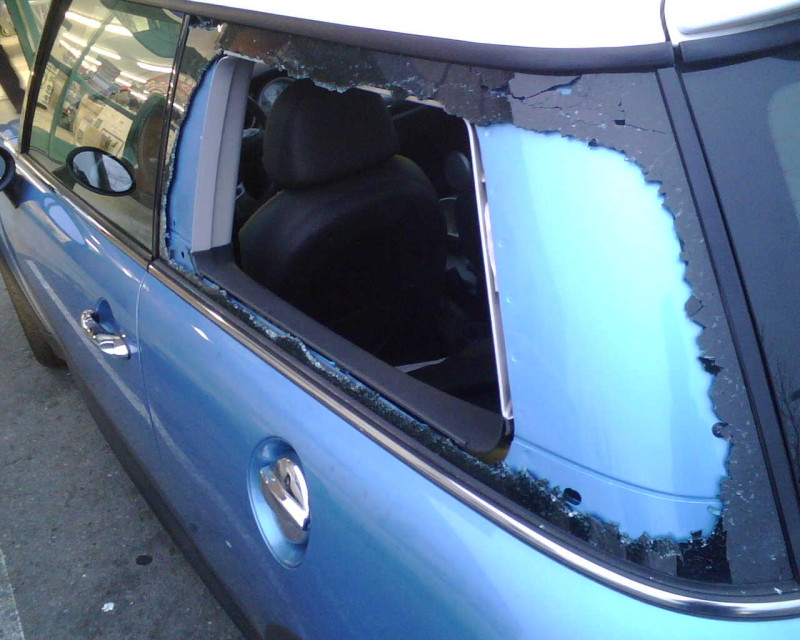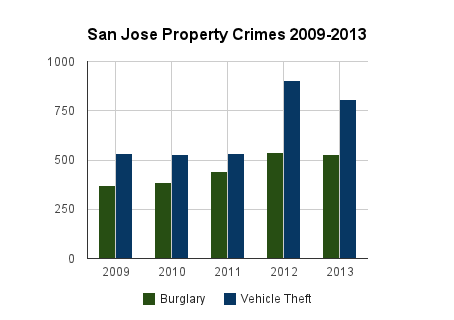Residential Crime Could Tip the Vote in San Jose’s Mayoral Race

It’s tough to unite neighborhoods in a city as sprawling, diverse and economically divided as San Jose.
But the issue of residential crime appears to be doing just that this election season.
San Jose residents are demanding that mayoral candidates Sam Liccardo and Dave Cortese answer one big question: How do they plan to reduce a relatively high rate of home burglaries and car thefts in the city? And voters are raising it at nearly every neighborhood meeting, debate and town hall.
“Residential crime is the issue right below the surface that could be the tipping point in the San Jose mayoral election,” said Larry Gerston, a political science professor at San Jose State University. “Residents have a real sense of insecurity because these crimes are happening in wealthy and poor areas. When crime isn’t insulated, you sometimes see a revolt by voters.”
Once called “America’s safest big city,” San Jose is struggling with crime in neighborhoods that once had a strong police presence.
“The level of emotional threat experienced is a function of the number of burglaries,” said Franklin Zimring, a UC Berkeley law professor and crime expert. “But also the amount of concern about burglary can feed off itself.”
Downtown resident Helen Chapman says she can explain why people are on edge about crime, if you walk around the neighborhood with her.
“Aaron behind there had his car broken into,” she said, gesturing behind her. “Peter next door on that side had his car broken into. I know there have been robberies on the other side [one street over].”
Shasta Hanchett Park is an upscale neighborhood filled with a lot of languages, young families and professionals. Chapman, who heads up the neighborhood association, points out that many of the homes are now equipped with security cameras on the outside to record burglaries and car thefts.
“We don’t see the police presence that we used to see,” she said. “You would be standing out here and you would see a patrol car going around the neighborhood. And now people have just gotten to the point of: Nothing is going to be done about it -- I have to take matters into my own hands.”
Chapman herself bought a security camera and now has a pit bull. She says all the crime has put a cloud over the neighborhood.
“You see a car that doesn’t belong in the neighborhood,” she said, “and they’re taking pictures and it might be perfectly OK for that car to be there.”

This didn’t just start. It’s been going on for about five years. According to official statistics from the San Jose Police Department, the rate of burglaries for every 100,000 San Jose residents has gone up by more than 40 percent since 2009. The rate of auto theft is up 51 percent.
There are many reasons but the biggest one, residents say, is that there simply aren’t enough police officers.
“We would like to see good complete law enforcement all across the board,” said David Eggulston, a Willow Glen resident.
The San Jose Police Department has lost about 380 cops over the last five years. The department was at a high point in staffing when the 2008 recession hit, and the force has dwindled steadily ever since.
Hayward Police Chief Diane Urban was on the San Jose police force for 25 years. She says the worst of the cuts hit the force in 2011.
“I will tell you I still have stress, post-traumatic stress, from the week I left,” Urban said. “The day it was announced I was becoming chief in Hayward, we gave about 84 pink slips out to our police officers.”
To cope with the ongoing budget cuts, the department started closing down special units: the violent crime enforcement team and the burglary unit.
“Any chief in the country is going to tell you that the No. 1 priority is to staff patrol,” Urban said. “So when you can no longer staff patrol effectively, to have enough men and women on the streets to protect people when they pick up the phone, you have to start closing down units.”

Today, according to a San Jose police spokesman, the department has one burglary detective to serve a city of 1 million people.
There are no longer detectives to make the follow-up phone calls, dust for fingerprints and talk to victims.
While budget cuts led to the biggest loss of police in San Jose, pension reform has become the flashpoint of the mayoral race. San Jose voters in 2012 approved reforms that changed disability benefits and asked city employees to contribute more to their pensions.
Some former San Jose police officers say it’s one reason they left the force. Ten of them are now with the Hayward Police Department. George Beattie, who once headed the Police Officers Association in San Jose, said in Hayward he gets better pay and benefits.
“Every officer, including those who came before and after me, says they came for the same reason -- financial security,” said Beattie, now Hayward PD’s personnel and training administrator.
Actually, the city lost a small number of officers after pension reform compared with what happened after the recession.
Mayoral candidates Sam Liccardo and Dave Cortese agree that San Jose needs more police officers. And each is trying to convince voters he’s the one who can make the city safer.
“Violent crime was higher when I came into office in 2007 -- and Dave Cortese was vice mayor -- than it was last year,” Liccardo said at the Santa Clara County Bench/Bar debate last month.
Cortese shot back: “I think it lacks credibility to say people feel safe in their neighborhood, that we are safer than we were six, seven or eight years ago.”
Voters like Brian Tran just want officers to show up when they have a problem. And that’s why he was outside the San Jose City Council chambers last week with roughly 100 homeowners from the city’s Evergreen neighborhood.
Tran asked how many people had been crime victims, and several dozen raised their hands. Last month, there were 95 reported burglaries in Evergreen. Tran’s house was ransacked in August.
"I’ve lived in the United States for 35 years -- first time I’m speaking out," Tran said. “What’s being done to the people in Evergreen, being done to San Jose, is not fair.”
Tran and other residents want more than rhetoric from the next mayor. They want neighborhood command centers, more police and more patrols -- whether it’s in middle-class Evergreen or affluent Willow Glen.
Lissa Minkin of Willow Glen says the quality of life in her neighborhood is deteriorating.
“And we know there are issues with San Jose as a whole in terms of not having enough police coverage,” Minkin said. “So I really want to see that change. Because it’s really going to change the area if it becomes unsafe. People are not going to want to live here anymore, which is terrible, because it is a wonderful neighborhood.”
Many San Jose voters say the candidate who can convince them they’ll get their peace of mind back will likely become the next mayor of this sprawling suburban city.